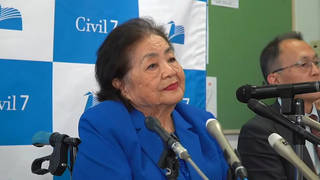
Topics
On May 2, nearly all of the governments in the world will meet at the UN to review the Nuclear Non-Proliferation Treaty–a review conference that takes place every five years. We take a look at some of the rallies and marches planned ahead of the meeting to demand global nuclear disarmament. [includes rush transcript]
On Monday, May 2, nearly all of the governments in the world will meet at the United Nations to review the Nuclear Non-Proliferation Treaty, a Review Conference that takes place every five years. A coalition of over 2,000 organizations around the world, have teamed up with United for Peace and Justice to organize a big march and rally this Sunday, the day before the conference opens, to demand global nuclear disarmament. Thousands of people are expected to attend including the mayors of Hiroshima and Nagasaki.
- Rhianna Tyson, Program Manager of Reaching Critical Will which is a project of Women’s International League for Peace and Freedom in UN office.
Transcript
AMY GOODMAN: Joining us in our studio is Rhianna Tyson, Project Manager of Reaching Critical Will, which is a project of the Women’s International League for Peace and Freedom, known as WILPF. She’s based the at the United Nations. Welcome to Democracy Now!
RHIANNA TYSON: Thank you very much.
AMY GOODMAN: Can you talk about Sunday and then the next week?
RHIANNA TYSON: Sure. First, I would actually like to say a little bit about the treaty itself and what this conference is to explain why thousands of people from around the world are coming here. This treaty is reviewed every five years, but what makes this year particularly interesting and important is that the treaty is basically in its biggest crisis to date. As you know, U.S. keeps threatening that Iran is developing nuclear weapons. North Korea withdrew from the treaty. Other questionable activities have popped up around the world, but the nuclear weapon states themselves, while threatening and accusing all of these other countries have completely reneged on their disarmament commitments in the treaty and in international law, as well. They’re also modernizing and upgrading their own arsenals, thereby provoking others to develop nuclear weapons, which in turn gives the U.S. justification to go to war. So at this particular time, with the growing peace movement, the movement against the Iraq war, thousands of us are going to be in Central Park to say, “Adhere to your disarmament commitments, no to the war in Iraq, and no to any more nuclear excuses for war.” So, we have labor groups coming. We have environmental groups coming. Youth, dozens of hibakusha, the atomic bomb survivors are coming. Not just the mayors of Hiroshima and Nagasaki, but mayors from all over the world will be marching through the heart of Manhattan and rallying at Central Park at 2:00 on Sunday.
AMY GOODMAN: What does it really mean to have this conference next week? I mean, is this sort of U.N. bureaucracy, or does it have meaning?
RHIANNA TYSON: It can have meaning. It’s actually not a U.N. conference. It just happens to be held at the U.N. That’s the forum of choice. What can happen is that they can come up with a package of decisions that are politically binding. They can put time frames for disarmament. They can tighten the rules for non-proliferation and the trade and so called peaceful uses of nuclear technology. The problem now is that the package of decisions that was adopted in 2000, the Bush administration has completely ripped up and said that has no more relevance in a post-September 11 world. By doing that, it is they that are undermining not only the N.P.T. review process, but international law as a whole. What’s the point of negotiating until 4:00 in the morning, as they did in 2000, if it can be so easily discarded? So really this is about not just upholding disarmament law, but international law as a whole.
JUAN GONZALEZ: And for people who want more information about the march and rally or the conference, where can they go?
RHIANNA TYSON: About the march and rally, the best place to go is either UnitedForPeace.org or AbolitionNow.org. And to follow the developments of the conference itself, ReachingCriticalWill.org, we do daily reporting from that conference throughout the month of May.
AMY GOODMAN: Finally, President Bush in his news conference last night talked about a new development of nuclear power plants. Does that have any impact on this?
RHIANNA TYSON: We believe, the Women’s International League for Peace and Freedom, as well as Abolition 2000, the coalition that you mentioned, are strongly opposed to nuclear energy. We believe that nuclear energy powers the bomb. So for the U.S. to continually promote nuclear energy will give not only the justification but the technology for others to proliferate, which again is further justification for future wars.
AMY GOODMAN: Rhianna Tyson, thanks very much for being with us, of Reaching Critical Will, project of the Women’s International League for Peace and Freedom based at the United Nations.













Media Options